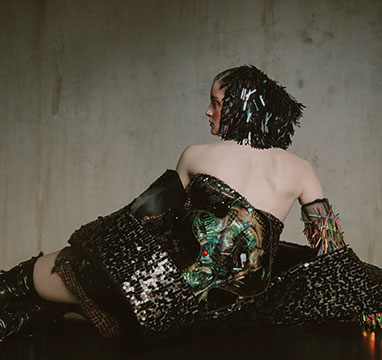- Fashion Courses
- Design Courses
- Art Courses
- Fragrances & Cosmetics Courses
- Courses for Professionals
- Short Courses
- Schools
- Admission
- Maze35 Magazine
- Newsroom
- I'M Alumni
- Careers & Industry Relations
- University Partnerships
- Get in touch

Interior Design
Bachelor's degree (180 CFA equivalent to 180 ECTS credits) recognized by the Ministry of University and Research
These undergraduate programmes are designed for participants looking to enter the design world, and provide a complete education allowing participants to acquire the necessary knowledge and skills to pursue a career in the chosen field.
Interpret space and enhance the way we live today using colour, layout, acoustics, lighting, furniture and
fabrics. Interior designers plan responding to the ‘identity’ of the given space, as well as taking on-board demands of physical wellbeing, and performance needs of the space in question. This three year course covers a complex mix of technical design skills (CAD), combined with a contemporary approach, learning how to create a story evoking both style and mood in the main areas of contemporary lifestyle interiors: residential, commercial, retail, public spaces, and exhibition design.
Participants discover how to interpret and ‘read’ a space, combining technical aspects in construction with contemporary design elements, fundamental for the successful management and development of design proposals. They research and evaluate past and current trends, and brand identity, responding to their own individual style combined with industry needs, project briefs, brand image strategies, or specific client requests. The history and evolution of interior design takes a look at the discipline as an art form and as a science in its ability to ‘transform’ space. Throughout the course focus is on interiors specific to the world of luxury where participants research and analyse the importance of brand identity, planning for retail spaces such as flagship stores, showrooms, trade fairs and exhibition spaces. ‘Real world’ experience in project development is achieved through collaborations with companies on industry projects, taking an idea from concept through to final presentation, as well as ‘signing-off’ the space upon completion. Covering different segments of the market participants receive professional feedback and guidance from the company throughout the project. A final graduation showcase event gives the opportunity to further network and engage with industry professionals. They are encouraged to experiment with contemporary design, and consider new approaches in the industry that are evolving today, including influences in sound, scent, tactile features, ‘well-being’ design, sustainability and innovative new materials. Being able to develop, design, and present forward-thinking solutions for interior design projects, with a strong aesthetic awareness, opens up diverse career opportunities in contemporary architectural and interior design practices, and interior divisions in the fashion, luxury and creative industries. This course forms the base of all three-year interior design study pathways. With interior design as the core subject, participants select from different pathways to specialise in a chosen area of interest, responding to individual creative flair and passion. This course is also available as a BA (Hons) four-year course (including Sandwich Year Placement).
- Spatial design
- Designing public spaces
- Residential design
- Brand identity into interior design
- Professional portfolio
- Materials and surfaces
- Illustration and colour technique
- CAD
- History of art and design
- Research approaches
The enrollment fee is due every year
APPLY NOW- Interior designer
- Interiors for editorial/publishing
- Showroom management
- Consultant for exhibitions/installations
- Set designer
- Interior designer
- Interiors for editorial/publishing
- Showroom management
- Consultant for exhibitions/installations
- Set designer
Inspiring and supporting students while helping them grow their skills, Mentors are a go-to person for future fashion, design & art talents.
Validated by Regent’s University London
For further information click here
The BA Interior Design program fosters dynamic collaborations with leading design organizations, experts, and innovators. Throughout the course, you will engage in a diverse array of real-world projects spanning from intimate small-scale spaces to ambitious proposals for expansive public and commercial interiors and become creative storyteller. By immersing yourself in this hands-on approach, you will unlock your full creative potential and cultivate a unique skill set to tackle complex design challenges with confidence and ingenuity.
The school's values embrace the potent mix of Italian luxury sector professionalism, London cultural and technological innovation, and diverse global perspectives from their students and tutors, providing unique opportunities to make a positive impact locally and globally. They prioritize creativity and imagination, while emphasizing professional standards, to apply design's potential to drive meaningful change for the Earth community.
The BA Interior Design covers spatial and technical design skills, contemporary approaches, and a user-centric and research-driven approach. The curriculum emphasizes the interpretation and improvement of space (adaptive reuse) using spatial tactics, color, layout, acoustics, lighting, furniture, and materials, while taking into account the space's identity, performance, and physical well-being. The course also explores interior design's historical development and examines the art and science of space transformation.
Students are encouraged to experiment with modern design and industry trends, such as sound, aroma, tactile elements, "well-being" design, sustainability, and application of cutting-edge materials. Graduates can pursue various career opportunities in the architectural, interior design, fashion, luxury, and creative industries. Through group project in the second-year students would explore what interior design means in the extreme climate regions of Earth or future habitation on other planets, as well as designing for metaverses.
The course emphasizes the importance of materiality, specification, and holistic human experience control in designing spaces, while providing a research-intensive learning environment to question and consider the designer's role in contemporary society. It fosters socially responsible, confident, innovative, and entrepreneurial graduates who have the knowledge, skills, and abilities to excel in practice or postgraduate study. As with all Design Programme courses, students can migrate from one to another to specialize and craft their individual route to industry.
Throughout their study students will be supported by number of internal and external tutors, guest speakers and industry mentors like Tom Dixon, visits to design studios, and field trips.
- Obtain a well-rounded education in interior design that covers multiple facets, such as design process, manufacturing methods, visual appeal, functionality, materials, computer programs, professional conduct, and building prototypes, in an industrial context.
- Experiment with advanced technologies such as AI within the context of Interior Design
- Enhance imaginative and analytical capabilities, gain extensive knowledge, and grasp fundamental interior design concepts necessary for interior design.
- Evaluate design solutions in a critical manner, considering competing restrictions, and challenging established design solutions.
- Exhibit advanced visual communication abilities and expertise in merging different design elements to form a unified interior design.
Year one
- Interior Architectural Fundamentals
- Approaching Interior Design, Project and Processes
- Interior Design Project
- History of Art, Design and Visual Culture
Year two
- Contemporary Project Analysis
- Interior Design Experience
- Interior Design Defined
- Design and Cultural Perspective
Year three
- Residential Interior Design
- Branded Environments
- Final & Graduate Projects
- Researching Theory and Practice
The enrollment fee is due every year
APPLY NOW- Interior Designer
- Architectural visualiser
- Setting up or transforming own business
- Transforming design practice
- Responsible design/business consultancy
- Responsible interior product development
- Work with charities, NGOs or social enterprises.
- Academic progression – MA, MPhil, PhD
This programme will equip students with the ability to engage with and respond to the massive changes happening in the Interior Design industry and in the luxury sector specifically. The industry needs people that can help it find solutions rather than perpetuate its problems; it is therefore anticipated that this programme will produce highly employable, forward-looking graduates that will offer new insights that lead change rather than following existing industry practice.
- Interior Designer
- Architectural visualiser
- Setting up or transforming own business
- Transforming design practice
- Responsible design/business consultancy
- Responsible interior product development
- Work with charities, NGOs or social enterprises.
- Academic progression – MA, MPhil, PhD
This programme will equip students with the ability to engage with and respond to the massive changes happening in the Interior Design industry and in the luxury sector specifically. The industry needs people that can help it find solutions rather than perpetuate its problems; it is therefore anticipated that this programme will produce highly employable, forward-looking graduates that will offer new insights that lead change rather than following existing industry practice.
Students who successfully complete this program will be awarded with a Bachelor of Arts accredited by the Ministry of Education-Commission for Academic Accreditation (CAA).
Interpret space and enhance the way we live today using colour, layout, acoustics, lighting, furniture and fabrics. Interior designers plan responding to the ‘identity’ of the given space, as well as taking on-board demands of physical wellbeing, and performance needs of the space in question.
This three-year course covers a complex mix of technical design skills (CAD), combined with a contemporary approach, learning how to create a story evoking both style and mood in the main areas of contemporary lifestyle interiors: residential, commercial, retail, public spaces, and exhibition design.
Participants discover how to interpret and ‘read’ a space, combining technical aspects in construction with contemporary design elements, fundamental for the successful management and development of design proposals. They research and evaluate past and current trends, and brand identity, responding to their own individual style combined with industry needs, project briefs, brand image strategies, or specific client requests. The history and evolution of interior design takes a look at the discipline as an art form and as a science in its ability to ‘transform’ space. Throughout the course focus is on interiors specific to the world of luxury where participants research and analyse the importance of brand identity, planning for retail spaces such as flagship stores, showrooms, trade fairs and exhibition spaces. ‘Real world’ experience in project development is achieved through collaborations with companies on industry projects, taking an idea from concept through to final presentation, as well as ‘signing-off’ the space upon completion. Covering different segments of the market participants receive professional feedback and guidance from the company throughout the project. Participants are also encouraged to experiment with contemporary design, and consider new approaches in the industry that are evolving today, including influences in sound, scent, tactile features, ‘well-being’ design, sustainability and innovative new materials. Being able to develop, design, and present forward-thinking solutions for interior design projects, with a strong aesthetic awareness, opens up diverse career opportunities in contemporary architectural and interior design practices, and interior divisions in the fashion, luxury and creative industries.
- Spatial design
- Designing public spaces
- Residential design
- Brand identity into interior design
- Professional portfolio
- Materials and surfaces
- Illustration and colour technique
- CAD
- History of art and design
- Research approaches
- Interior designer
- Interiors for editorial/publishing
- Showroom management
- Consultant for exhibitions/installations
- Set designer
- Interior designer
- Interiors for editorial/publishing
- Showroom management
- Consultant for exhibitions/installations
- Set designer










.jpg)
